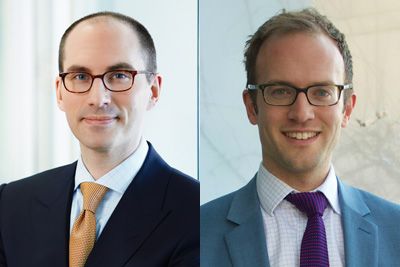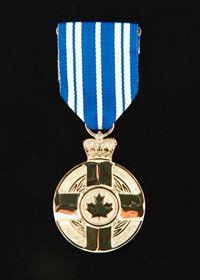

Alumnus Owen Rees and Professor Grégoire Webber of Queen’s Faculty of Law have been selected to receive one of Canada’s most prestigious civilian honours.
Rees, Law’02, a partner at the highly regarded Toronto boutique litigation firm Stockwoods, and friend Webber, the Canada Research Chair in Public Law and Philosophy of Law, will be awarded Meritorious Service Medals at an upcoming ceremony in Ottawa. The medals, established by Her Majesty Queen Elizabeth II to recognize individuals for remarkable achievements, will be presented by Governor General David Johnston, Law’66, LLD’91.
Rees and Webber are being honoured for their contributions to the legal profession, primarily their work in launching the Supreme Court Advocacy Institute. This independent non-profit agency, which is celebrating its tenth anniversary in 2016, has been instrumental in improving the quality of legal advocacy in Canada.
“In our legal system, vigorous, well-presented, and effective advocacy is of service to the courts in presenting fully the various sides of the issues that come before them,” says Chief Justice of Canada Beverley McLachlin. “We welcome the [Institute]’s contribution to the Supreme Court of Canada and to the public by providing both novice and experienced counsel with a forum in which to refine their advocacy.”
Rees and Webber, both Montrealers, met in 2003 while clerking at the Supreme Court of Canada – Rees for Justice Louis LeBel, Webber for Justice Ian Binnie. “When Owen and I attended hearings on the cases for which we’d prepared legal briefs for the judges, sometimes we thought that the Court could be getting more assistance from counsel,” says Webber.
Rees and Webber were aware of the Supreme Court Institute (SCI), a Georgetown University law school-based program that promotes awareness of issues of importance to the United States Supreme Court. The centrepiece of the SCI’s activities is a moot court program that offers lawyers the opportunity to test-drive legal arguments they intend to make in their submissions to the Supreme Court.
“We wondered if there was room for a similar initiative here in Canada,” says Rees. “If so, we knew it would have to be purpose-built for Canadian needs. That meant it had to be low-cost, accessible to all, and national in its scope.”
With help and encouragement from Justice Frank Iacobucci, the Institute was born; Iacobucci, who was about to retire from the bench, agreed to serve as its chair. “I didn’t hesitate to support [the program],” recalls Iacobucci.
“My reasons were simple. First, the aim of the proposal was to improve oral advocacy before the Court, which would be to the benefit of clients, the Court and the legal profession for their involvement. Second, Owen and Grégoire were law clerks in whom my colleagues and I had confidence and who were ideal to create and organize the Institute.”
Not surprisingly, the initiative garnered enthusiastic support from Canada’s legal community. And that support has only continued to grow in the years since 2006. When the first moot court sessions were held in 2007-2008, they took place in Ottawa, Toronto and Montreal. Today, the Institute sends out invitation letters to every lawyer who’s granted leave to appeal to the SCC, and the moot courts now are staged in major cities across the country. At first, about 20 per cent of eligible lawyers availed themselves of the opportunity to take part in the sessions. In 2014-2015, that number was close to 50 per cent.
“We wanted to make sure the program would be free and available to any lawyer who’s scheduled to argue a case before the SCC,” says Webber. “Some of the larger firms in Canada and various federal and provincial Justice departments have their own in-house programs; however, we felt there was a real need for a non-partisan program that would be available to lawyers from smaller firms and cities across the country and wouldn’t be seen as just a central-Canadian initiative. In that sense, the Institute helps level the legal playing field.”
Rees echoes those words. “Grégoire and I saw the Institute both as a vehicle to help promote advocacy skills and as a way for us to give back to the legal profession and the Court,” he adds. “Being awarded a Meritorious Service Medal obviously is a special honour, but we’re really accepting it on behalf of the many people who have helped set up the SCAI and make it a success – in particular Frank Iacobucci and all of the talented advocates who selflessly volunteer their time and legal expertise when they act as advocacy advisors during practice sessions or serve on our national and regional committees.”
Read more about the Supreme Court Advocacy Institute.